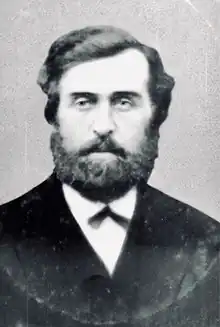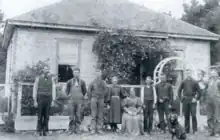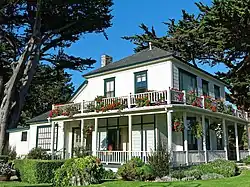John Martin (pioneer)
John Martin (December 11, 1827 – February 28, 1893), was an early pioneer of Monterey County, California. In 1859, he purchased 216 unsettled acres (87 ha) near the mouth of Carmel Valley near today's Carmel Mission, before the development of Carmel-by-the-Sea. The Martin homestead is now called Mission Ranch. It was bought in 1986 by Clint Eastwood, who restored the farmhouse, cottage, and barn in the style of the original buildings.[1][2]
John Martin | |
|---|---|
 John Martin | |
| Born | December 11, 1827 Strathaven, Scotland |
| Died | 28 February 1893 (aged 65) |
| Occupation(s) | Farmer, dairyman |
| Spouse | Elizabeth Hislop |
| Children | 6 |
Early life
John Martin was born on December 11, 1827, in Strathaven, Lanarkshire, Scotland. His parents were pioneers William Martin (1799-1885) and Agnes Martin (1797-1878). William and Agnes Martin emigrated from Scotland with their five sons, John (1827-1893), Robert (1828-1905), William (1832-1913), James (1835-1913), Thomas (1840-1911), and a daughter Mary (1837-1916). They first came to Ontario, Canada in the 1840s. During the California Gold Rush, they sailed by steam boat from Canada to Panama, traveling through the Isthmus of Panama by boat up the coast. When they landed in Monterey by ship in 1856, they acquired a ranch at Neponset, California, an area north of Monterey, where the family became farmers.[1][3]
Professional life
.png.webp)
John Martin bought 216-acre (0.87 km2) from land broker Lafayette F. and Annie Loveland in 1859. The land was bounded by 12th and Santa Lucia avenues, which today is known as Carmel Point, Hatton Fields, and the Carmel River. The property became known as Mission Ranch because it was so close to the Carmel Mission.[1][4][5][6][3]
The Martin Ranch was a cattle ranch and dryland farming operation. They farmed potatoes, barley, and had a milk dairy.[3][7][5] The property became one of the first California dairies that supplied the county with cheese and butter. The barns were used for hay and milking.[8][9]

Martin married Elizabeth Hislop Stewart (1840-1916) on February 10, 1871, in Middlesex, Ontario, Canada, while he was visiting Canada. She was a widow with three sons. Martin and Elizabeth had six children together in 12 years, raising them at the Martin ranch and dairy. James A. (1871-1936), William E. (1873-1959), and Royden Martin Sr. (1882-1961) of Carmel Valley, Robert Henry Martin (1875-1934) of Neponset, Carmel Martin (1879-1965) of Monterey, and Isabel Martin (1884-1961) of Carmel, were all born on the Martin Ranch.[1]
John Martin built a one story hipped-roof farmhouse in the early 1870s for his wife and children. The ranch included barns, bunkhouse, and several outhouses. A second story was added by 1896. The farmhouse is still present today and is part of the Mission Ranch resort.[3][5]: p23
Death

Martin died by suicide on Tuesday, February 28, 1893, in what is today known as Carmel-by-the-Sea, California, at the age of 65. He had been sick for several weeks, and hung himself from a tree on his ranch according to the coroner.[2][10] His remains were buried at the Martin Plot, at the Monterey City Cemetery in Monterey, California.
His wife, Elizabeth stayed on the ranch for the rest of her life. She died on November 25, 1916, in Carmel, having lived a long life of 76 years. Her funeral took place at the family ranch. Her remains were buried at the Martin Plot, at the Monterey City Cemetery.[11]
Legacy
Today, the 20-acre (0.081 km2) ranch is the Mission Ranch hotel and restaurant, now owned by Clint Eastwood since 1986. He restored the property in the style of the original buildings. Buildings on the property reflect the architectural period of the 1850s, that includes the restaurant and dance barn and the century old Martin farmhouse and bunkhouse.[12][5]
References
- Barratt, Elizabeth (2009). Carmel Valley. pp. 39, 41. ISBN 9780738571621. Retrieved 2022-12-11.
{{cite book}}:|work=ignored (help) - "Suicide of a Monterey Pioneer". The San Francisco Examiner. San Francisco, California. March 1, 1893. Retrieved 2022-12-12.
- Neal Hotelling (2021-12-10). "There were horses, cows and swine, but surprisingly, no sheep" (PDF). The Carmel Pine Cone. p. 23. Retrieved 2021-12-10.
- Daisy Bostick (1947-09-26). "Carmel Story Shifting Scene Cahpter III". The Carmel Pine Cone. p. 8. Retrieved 2022-07-08.
- Seavey, Kent (2007). Carmel, A History in Architecture. p. 19, 22, 23. ISBN 9780738547053. Retrieved 2022-12-12.
{{cite book}}:|work=ignored (help)CS1 maint: location missing publisher (link) - Hale, Sharron Lee (1980). A tribute to yesterday: The history of Carmel, Carmel Valley, Big Sur, Point Lobos, Carmelite Monastery, and Los Burros. Santa Cruz, California: Valley Publishers. p. 38. ISBN 9780913548738. Retrieved 2022-01-18.
- Dramov, Alissandra (2013). Carmel-By-The-Sea, the Early Years (1903-1913). p. 86. ISBN 9781491824139. Retrieved 2021-12-07.
{{cite book}}:|work=ignored (help) - "Salinas Daily Journal". he Californian. Salinas, California. 14 Mar 1897. p. 3. Retrieved 2021-12-06.
- Randall, Frank Alfred. The History of Mission Ranch. Retrieved 2021-12-06.
{{cite book}}:|work=ignored (help) - "A Determined Suicide". The Californian. Salinas, California. March 2, 1893. Retrieved 2022-12-12.
- "Much Beloved and Respected Woman Passes Away". The Carmel Pine Cone. 1916-11-29. p. 1. Retrieved 2022-12-13.
- "Eastwood Purchases Historic Mission Ranch". The Californian. Salinas, California. 11 Dec 1986. p. 2. Retrieved 2021-12-06.